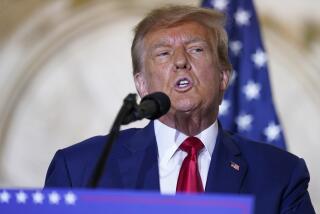Carville Resumes Campaign Against Starr
- Share via
WASHINGTON — Presidential advisor James Carville renewed his blistering campaign Tuesday to discredit independent counsel Kenneth W. Starr, despite earlier indications that he would back away in the face of heated Republican criticism and concern by some Democrats that the campaign is counterproductive.
In a breakfast session with national news media, Carville described Starr as a highly partisan Republican who is following a right-wing agenda against a Democratic president he does not like. He accused Starr of being influenced by Clinton’s enemies and of directing a partisan investigation that has harassed witnesses and pried into the president’s sex life.
Carville launched his campaign against Starr on Nov. 24 in an appearance on “Meet the Press” soon after Starr had said in a speech that his investigation was making progress and was at a “crucial juncture.”
Starr, who served as solicitor general in the Bush administration, has been investigating the involvement of the president and First Lady Hillary Rodham Clinton in an Ozarks real estate venture called Whitewater and other matters since August 1994.
Later, in the face of criticism, Carville indicated that he might back away from plans to form an organization and solicit funds to wage the anti-Starr campaign. If Starr “acts as an independent counsel should act,” Carville said Tuesday, he probably will not run anti-Starr advertisements.
But he made it clear that he will keep the pressure on by continuing to speak out. In a scathing outburst, he accused the news media of failing to examine Starr’s activities.
Starr has shown “terrible judgment,” he said, in asking witnesses about the president’s sex life, subpoenaing a 16-year-old student at school, allowing leaks to the media, drawing $1 million annually in legal fees for representing Clinton’s political enemies at the same time he is investigating the president, and in speaking at Pat Robertson’s university after the anti-Clinton television evangelist had predicted that the first lady would be indicted.
Carville also railed against Republicans for portraying him as an “out-of-control buffoon” and for trying to “criminalize” his anti-Starr activities. Republicans have suggested that Carville is trying to obstruct justice by impugning Starr’s integrity and thus impairing his investigation.
Carville said he has consulted two lawyers about his anti-Starr activities. Asked if they advised him to proceed carefully, Carville said: “Hell no, they said, ‘What you’re doing is perfectly legal. Have at it.’ ”
White House Press Secretary Mike McCurry said Tuesday that Clinton refuses to comment on the matter.
Carville has said that the president has not tried to persuade him to stop speaking out.
Clinton, in a TV interview in September, said it was “obvious” that Starr was out to “get” him and his wife. The president has said privately that he has mixed feelings about Carville’s campaign. While he has said that he understands and shares Carville’s frustrations about Starr’s inquiry, Clinton has expressed concern that the statements may hurt him politically.
Joseph E. diGenova, a Republican and former independent counsel, said Carville’s campaign is legal but “unseemly,” and, if it continues, it “must be viewed by any normal person as having the imprimatur of the White House and that is not good for the president.”
“It is a very aggressive campaign and it is making it look like they have something to hide,” diGenova said. “The president is the chief law enforcement officer of the United States and he is condoning by inaction the comments of James Carville against a lawfully appointed prosecutor who has been given expanded jurisdiction by this president’s attorney general.”
Carville said his campaign already has succeeded in putting the Starr issue on “the table of public discussion.” As a result, whatever Starr does will be subject to more scrutiny. Carville cited a CBS poll of Dec. 4-5 that showed that 42% of Americans believe the investigation is mostly partisan, while 34% believe it is not partisan.
Carville said that he had wanted to begin the campaign as soon as Starr was appointed in August 1994, but that Clinton aides had persuaded him not to do it.
Times staff writer Elizabeth Shogren contributed to this story.
More to Read
Sign up for Essential California
The most important California stories and recommendations in your inbox every morning.
You may occasionally receive promotional content from the Los Angeles Times.













